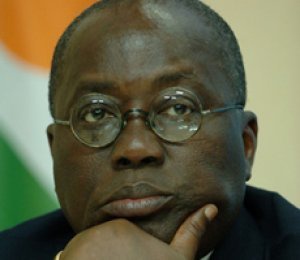The New Patriotic Party (NPP) on Monday indicated that the next government under Nana Addo Dankwa Akufo-Addo's leadership would tackle corruption through a principled leadership that would focus on protecting the public purse.
“Nana Akufo-Addo commits himself to running a government that would give value for money and tackle corruption with vigour and sincerity, spending public money must be seen and treated as a sacred trust especially by politicians and public servants, in general.
“NPP Government will introduce institutional reforms that will enhance the autonomy, confidence and funding of statutory anti-corruption institutions,” an electronic statement made available to the Ghana News Agency in Accra by Mr. Asare Otchere-Darko, DI Executive Director stated.
Quoting from NPP’s Election 2012 Manifesto which would be launched on August 25, Mr. Otchere-Darko said the manifesto begins with a bold statement which aims at strengthening the institutions of governance so that they work without undue political interference.
He said the manifesto’s introductory page sets out what Ghanaians should expect from the next NPP Government: “Our vision is to create a society of opportunities for the Ghanaian people.
“We recognise that the quality of our nation will be determined by the quality of our people. This means a Ghana that will put the welfare and well-being of the people first, enabling them to achieve their aspirations.
“A transformed economy is key to this happening, quality education, good healthcare services, skills and knowledge for our children, world-class infrastructure and decent housing are fundamental to building a society of opportunities for every Ghanaian”.
Mr. Otchere-Darko said the NPP’s manifesto sought to industrialise and add value to the economy.
“It is this necessary economic paradigm shift that will open up our economy to offer Ghanaians the opportunities, confidence and incentives to live a prosperous life. Ghana must work and we must get it to work for the people.
“The driving philosophy of the next NPP Government would be the transformation of Ghana, supported by a value-for-money administration of public funds”.
The party believes that for it to succeed in meeting the growing demands for access to public goods, such as good education, good healthcare, a more efficient police service and infrastructure, it must be deliberate and disciplined in ensuring that public funds are spent responsibly and public contracts are negotiated in the supreme interest of the state.
The NPP promises to “transform the way our children are educated” and sets out the plan for free, quality public education from Kindergarten to Senior High School, with the training, conditions of service and supervision by and of the teacher at the centre of the new education policy.
On empowering the private sector, the NPP manifesto lamented over what the party saw as the “unpardonable neglect” of the private sector in Ghana under the NDC; the NPP aims to increase significantly the current level of public-private-partnership, more so in the provision of electricity, water, and transportation, including roads, railways and aviation.
To the Ghanaian private sector, which is in distress, with low business and consumer confidence, the NPP Manifesto assures the electorates that the party understands business.
“It would be bold in empowering local businesses, particularly manufacturers, road contractors, farmers and real estate developers, to grow and capture a dominant portion of the domestic market and compete in international markets.
“The NPP has a programme to cut down on red tape, while empowering regulatory bodies to enhance standards of service providers and ensure value-for-money for customers.
“Doing business would also be made easier with a proper address system for our communities, investing in IT-enhanced services in the public sector and implementing the national ID card project,” the statement stated.
On decentralisation, the next NPP Government would work on devolving more power and increasing accountability at the district level.
On waste management, NPP plans to introduce cutting edge green innovations which would turn our waste, including plastic waste, into electricity to feed the national grid, fertilizer for farming and roofing sheets for building construction, for example.
The NPP said it had no intention to reinvent the wheel, “We will only work hard and smart to implement in Ghana the socio-economic policies that have made nations industrialised and competitive and the lives of their people better”.
On the economy, the NPP manifesto saw the structural transformation of the Ghanaian economy to be paramount, and “We will provide the leadership, right policies and effective management to make it happen.
“We cannot enrich the lives of the Ghanaian by continuing to export our raw cocoa beans, our mined gold, our drilled oil, our sawed timber and other raw materials without adding value.
“We also cannot keep importing even the simplest things we use when we can and should manufacture them here. Our small businesses must be actively supported to get working and producing, thriving and growing to become bigger and better, serving Ghana and beyond”.
The NPP sees farming as crucial to its transformation programme, “Primarily, transforming the Ghanaian economy means transforming agriculture. We will make farming work for the farmer by supporting, not only the big commercial farmer, but also the small and medium scale farmer.
We will increase production and value in the agricultural sector to create jobs, make Ghana self-sufficient in food and a major agro-based industrial nation in our region,” the 2012 NPP Manifesto stated.
NPP Election 2012 Manifesto Committee is chaired by Professor Yaw Twumasi, who also chairs the Governing Board of the Danquah Institute.**
Politics of Tuesday, 7 August 2012
Source: GNA

















